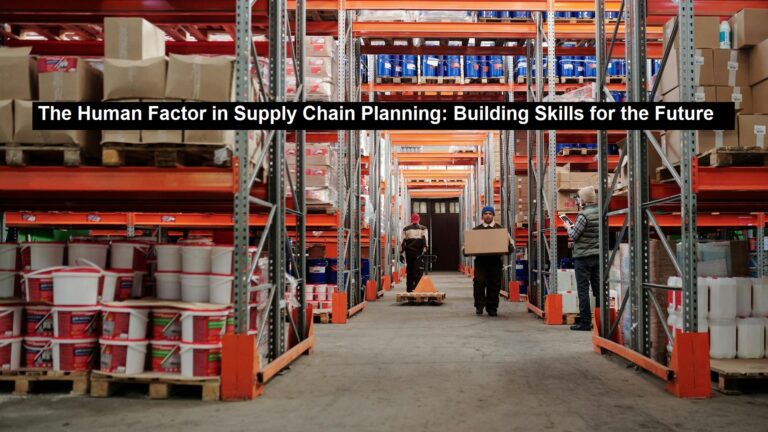In an era dominated by digital transformation, automation, and artificial intelligence, the role of human expertise in supply chain planning remains irreplaceable. While technology plays a critical part in enhancing efficiency and driving innovation, the human factor is crucial in managing complex, unpredictable, and strategic aspects of supply chain operations. As businesses increasingly seek supply chain solutions to optimize their processes, the demand for skilled professionals who can navigate this evolving landscape is at an all-time high. This article explores the importance of human skills in supply chain planning and the key competencies needed for the future.
The Evolving Landscape of Supply Chain Planning
Supply chain planning has evolved significantly over the past few decades, transitioning from traditional logistics and inventory management to a sophisticated field encompassing procurement, production planning, distribution, and customer service. With the advent of technologies such as predictive analytics, Internet of Things (IoT), and machine learning, the supply chain is becoming more interconnected, data-driven, and responsive.
However, despite these technological advancements, human judgment, creativity, and problem-solving abilities remain essential. Technology can analyze vast amounts of data and identify patterns, but it lacks the intuition and strategic thinking required to navigate uncertainties, such as geopolitical shifts, natural disasters, or sudden changes in consumer behavior. This is where human skills come into play—bridging the gap between data-driven insights and practical, real-world decision-making.
Read: A Comprehensive Overview of Factory Relocation Timelines
The Key Human Skills for Future Supply Chain Planning
To thrive in the future of supply chain planning, professionals must develop a combination of technical and soft skills. Here are some of the most important competencies that will define successful supply chain planners in the coming years:
- Analytical Thinking and Data Literacy: As supply chains become increasingly data-centric, the ability to analyze, interpret, and leverage data is crucial. Supply chain planners must not only be comfortable working with data but also possess the skills to translate data insights into actionable strategies. This requires a solid understanding of data analytics tools, statistical methods, and the ability to communicate complex information in a clear and concise manner.
- Strategic Thinking and Problem Solving: Supply chain planning is not just about day-to-day operations; it’s about anticipating future challenges and opportunities. Planners need to think strategically, considering long-term impacts and aligning supply chain activities with overall business objectives. This involves assessing risks, identifying potential disruptions, and developing contingency plans to ensure resilience.
- Adaptability and Agility: In a rapidly changing environment, supply chain professionals must be adaptable and agile. This means being open to change, willing to learn new skills, and able to pivot quickly when circumstances demand it. The ability to respond swiftly to disruptions—whether they are caused by technological advancements, market shifts, or unexpected global events—will be a key differentiator.
- Collaboration and Communication: Supply chain planning involves coordinating with various stakeholders, including suppliers, manufacturers, logistics providers, and customers. Effective communication and collaboration are essential for ensuring that everyone is aligned and working towards common goals. Planners must be skilled in negotiation, conflict resolution, and building strong relationships to foster a cohesive supply chain network.
- Technical Proficiency: While human skills are indispensable, technical proficiency in the use of supply chain software and tools is equally important. Familiarity with Enterprise Resource Planning (ERP) systems, Warehouse Management Systems (WMS), and other supply chain solutions enables professionals to optimize processes and enhance productivity. A deep understanding of how these tools integrate with broader supply chain strategies will be critical for future success.
Building Skills for the Future
As the supply chain field continues to evolve, organizations must invest in the development of their workforce. This involves providing training and upskilling opportunities, fostering a culture of continuous learning, and encouraging innovation. By equipping their teams with the necessary skills and knowledge, businesses can ensure that their supply chain planning capabilities remain competitive and resilient.
Educational institutions also play a key role in shaping the next generation of supply chain professionals. Curriculum development should focus on blending technical training with soft skills development, preparing students to navigate the complexities of modern supply chain planning.
While technology will undoubtedly continue to revolutionize supply chain planning, the human factor remains a critical component of success. By cultivating the right skills, supply chain professionals can effectively complement technological advancements, driving innovation and resilience in an increasingly complex and interconnected world. As companies seek comprehensive supply chain solutions, the emphasis on human expertise will only grow, highlighting the enduring value of skilled professionals in shaping the future of supply chain planning.




